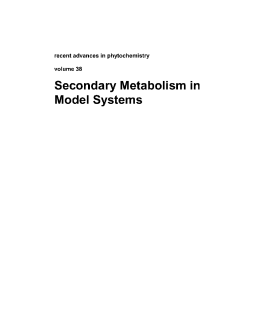
Additional Information
Book Details
Abstract
The chapters presented in Secondary Metabolism in Model Systems are a microcosm of what the recent completion, or near completion, of various genome projects are enabling biochemists to understand not only about control and regulation of secondary metabolism, and how various pathways relate to each other, but also about its relation to primary metabolism. A major paradigm shift is occurring in the way researchers need to view "secondary" metabolism in the future.It is also clear that model systems, such as the ones discussed in the symposium, are providing new information and insight almost faster than researchers can process it!
The volumes in this series contain articles on developing topics of interest to scientists, students and individuals interested in recent developments in the biochemistry, chemistry and molecular biology of plants.
- An excellent series volume covering the advances in understanding of gene functions, a high profile area of research due to recent genome projects
- This book provides essential information on new model systems available to biochemists
- The chapters in this volume are based on the papers presented in the symposium entitled "Secondary Metabolism in Model Systems"
"This volume forms part of the continuing excellent series of 'Recent Advances in Phytochemistry' derived from the proceedings of the Phytochemical Society of North America. The editor has done a good job of assembling the volume which will form a useful review of the state-of-play in our understanding of the secondary metabolism of these five model organisms. In particular the volume collectively identifies key emerging issues in phytochemistry. As such it is a very useful read for researchers and advanced level teachers of phytochemistry who may still be sceptical about the value of model organisms in studying metabolic diversity and is a useful point of reference for future studies in other crops and medicinal plants."
Robert Edwards, Chair in Plant Science, School of Biological and Biomedical Sciences, Durham University, UK, PHYTOCHEMISTRY 67 (2006)
